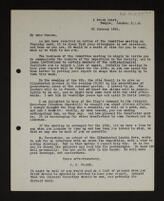The British Hospital, Hôtel Bellevue, Wimereux.—(24th.) Describes her journey to Wimereux, her impressions of the hospital, and her timetable of work. There is much discussion of the crisis, and she nearly quarrelled with a doctor who questioned Winston’s sense of decency.—(25th.) The railway and the ambulances are noisy. She has been to Boulogne to see Frances, and has tried to read ‘Joseph’. Is bored by the prospect in front of her, but will soon settle in. Urges him to pass on political gossip and war news.
—————
Transcript
The British Hospital, Hotel Bellevue, Wimereux
(Not my address | I gave you that didnt I?) {1}
Monday evening May 24th 1915
My darlingest not a vestige of a submarine disturbed our crossing and we arrived safely to find Sir Henry awaiting us on the platform. I couldnt telegraph as it takes hours. We came straight out here. The hospital is a rather squalid hotel in a street facing onto a small river, but one sees the sea not 300 yards away. I’ve not looked into the wards yet, but start tomorrow. Its much less arduous than the London breakfast at 7.30 instead of 6.30 and supper 8.15 instead of 9.30, so you see we are in clover. I’ve a reasonably nice room in which I’ve stowed myself and belongings with difficulty. After today I shant see much of the Normans, which I dont regret. They talk about the crisis a good deal, & I’m sorry to say I’ve nearly had a quarrel with a foul little doctor about whether Winston had any sense of decency or not. {2} I feel resigned and detached about the prospect of these next few weeks, but I miss you horribly. I’ll finish tomorrow. Goodnight, I hope you are dining somewhere and having fun. {3}
The noise is awful in this place, I hadnt realised that apparently the most vital railway from the whole world to the front passes within 20 yards of us, also ambulances drive up from time to time. I’m just going to have breakfast. Sir Heinrich has to pass all my letters so I shall feel a certain reluctance to write every day to you, but I daresay I shall become quite brazen about this. {4}
I’ve been into Boulogne and seen Frances, who has again been very anxious about Edward who has had a temp of 104, he’s better to-day.
My darling: Joseph is one of the most tedious writers I’ve ever come across. I tried him last night and found it anything but stimulating, or is it that all forms of religion, and the observances which accompany them & to which the religious attach so much importance, are bound to appear very foolish to someone like me. Still it doesnt matter as its not going to affect you or me afterwards.
I’ve just got your telegram {5} (11·30) thank you so much, I wonder when I shall get a letter from you. I’ll confess to you at once that I feel very much bored at the prospect in front of me, but then one always feels like that for the first few days, I shall soon become thoroughly happy in my new surroundings.
Write me every scrap of political gossip you can find, also any war news, as you know I never read the papers so I rely on you.
The doctors are mostly half casts† and very squalid looking.
This is worthy of your collection of letters at Cambridge its every bit as boring. What fun we had then. I wish I was back in England.
My love to you always
Venetia
—————
Partly written in pencil (see below).
{1} ‘Not … didnt I?’ is written below the printed address in pencil. The brackets have been supplied.
{2} The allusion is to Churchill’s handling of the Dardanelles campaign.
{3} The writing changes from ink to pencil here.
{4} A new sheet begins here. What follows was written slightly later.
{5} This does not survive.
† Sic.



